Anticipating regulatory requirements
The seller will need to provide much necessary information to accommodate the SPAC’s filing with the SEC. The regulatory requirements for a SPAC transaction are quite consistent with those for a traditional IPO and therefore are quite involved. Of course, audited financial statements will be a requirement. However, there are a plethora of differences between public-company and private-company financial reporting requirements, including the following, among many others:
- Some privately owned companies do not have in place adequate accounting or internal control systems that will be required once they are publicly owned. These issues should be addressed long before a SPAC transaction is undertaken to prepare the company to evaluate and disclose material changes to its internal controls over financial reporting on a quarterly basis, and also to provide quarterly disclosures and certifications regarding the effectiveness of disclosure controls and procedures. Additionally, at some point in the future, the company’s auditors may be required to audit the effectiveness of internal control over financial reporting.
- Most private companies that maintain their records in accordance with U.S. generally accepted accounting principles (GAAP) usually do not follow some of the unique incremental accounting principles or disclosures that generally are required of public entities, such as those related to stock-based compensation issues, segment disclosures, and earnings per share, among others. However, all financial statements filed as part of the SPAC transaction must be prepared in accordance with public company GAAP. This means that, in addition to the incremental public-company accounting principles and disclosures that must be followed, a private company would need to unwind previously elected private company accounting alternatives, such as the election to amortize goodwill. It may be wise to take an inventory of the many public/private GAAP differences affecting the company so as to better understand the potential scope of the necessary financial reporting endeavors and the potential need to restate prior-year financial statements.
- If the private company has made acquisitions, the audited financial statements of the acquired businesses might be required for certain periods prior to the acquisition date. The number of years to be included in the registration statement generally is based on the significance of several defined metrics of the acquired business. Consider discussing this issue with the company’s auditor early in the process.
- The audit of the financial statements must be performed by an audit firm that is registered with the Public Company Accounting Oversight Board (PCAOB). Further, all periods presented (which can be up to three years) in the financial statements must be audited in accordance with PCAOB standards. If the audit of prior years was performed in accordance with U.S. generally accepted auditing standards, the audit firm will need to perform certain procedures to ensure it can issue its opinion in accordance with PCAOB standards. Also, the company’s auditor will need to meet SEC and PCAOB independence requirements, which generally are more restrictive than those of the American Institute of Certified Public Accountants. In particular, the board should consider whether any prohibited non-audit services have been provided by the auditor. Certain independence violations may require previously audited financial statements to be reaudited by a different audit firm.
- Private companies historically may not have prepared interim financial statements, which will be a requirement under SEC rules. Consider establishing proper controls and procedures now for accurately preparing such information on a timely basis in the future.
- Pro forma financial information will be required in the registration statement, and this will necessitate the preliminary determination of the appropriate acquisition accounting, which can be complicated.
- In addition to the financial statement requirements, the registration statement also will need to include disclosures that private companies are not accustomed to making, such as, among many others, the executive compensation disclosures required by SEC Regulation S-K Item 402, and management’s discussion and analysis of financial condition and results of operation in accordance with Regulation S-K Item 303.
- After the transaction, the company is required to file certain periodic reports with the SEC in compliance with strict deadlines. Such reports include a Form 10-K, which is required to be filed annually; a Form 10-Q, which is required to be filed quarterly after the conclusion of each of the first three fiscal quarters; and a Form 8-K, which must be filed within four business days of certain events, such as entry into or termination of a material definitive agreement, acquisition or disposition of a significant amount of assets not in the ordinary course of business, material impairments, etc. The company’s financial-reporting procedures will need to be geared to meet these deadlines.
Potential leadership changes
Once acquired by or merged with a SPAC, the company becomes publicly traded, which means it is subject to SEC regulations and the requirements of the stock exchange on which the shares are listed. Therefore, a public company board of directors will need to be established and may or may not include existing board members. It may be prudent to determine how a particular SPAC handles board member selections.
It also will be important for the board to analyze whether key company leaders have the requisite capabilities for managing ongoing operations in a public-company environment. Areas and processes to be considered for review through this lens include:
Other considerations
There will be many additional considerations, including industry-specific and company-specific factors, for targets of SPACs to ponder. Once becoming a publicly owned company, it is extremely difficult to reverse the process. Therefore, make sure the possible SPAC transaction journey is undertaken with lots of advance planning. Obtaining sage advice from experienced outside counsel can be invaluable before going too far down the SPAC road.


